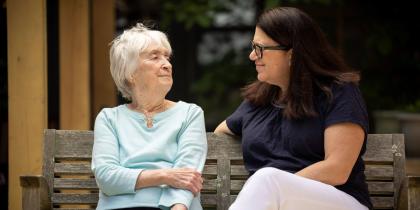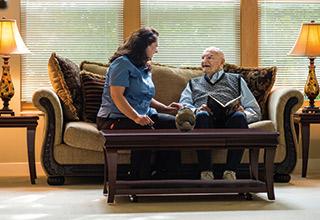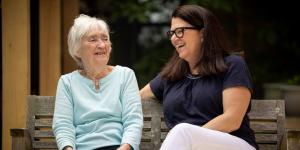Navigating Caregiver Guilt with Compassion When a Parent Moves to Assisted Living
Read about finding peace of mind when caring for a parent at home is no longer possible.

Moving a parent to an assisted living or memory care assisted living community is a deeply personal decision that reflects a commitment to their continued well-being, especially if their ability to make complex decisions has changed.
In addition to logistics and planning, strong emotions often arise. One of the most profound emotions that many adult children who have taken on a caregiving role experience during a parent’s move to assisted living is guilt.
As both the assisted living program specialist at NewBridge on the Charles in Dedham, MA, and as a daughter who cared for a mother with Alzheimer’s disease, I know how heavy this guilt can be. Working to unpack these feelings and practicing strategies that can ease guilt can help you gain some peace of mind during their transition.
This guidance is most relevant for those with a health care proxy in effect. In those cases, you may be working through making a decision based on your parent’s care needs and previously expressed wishes. If that isn’t your situation, remember that you can share your perspective and support your parent through transitions, but the decision to move rests with them — even if you believe it’s in their best interest.
Understanding where guilt comes from
When caring for our parents, we naturally want to honor their wishes. Many older people have negative feelings and assumptions about senior living, which can lead to statements like, “Never put me in a nursing home.” While nursing homes and assisted living communities aren’t the same, some people group them together, and the idea of any extra care can feel intimidating.
“That statement can cause people to become stuck. Even if moving could lead to positive outcomes, when adult children have the echo in their mind of ‘never do this to me,’ they feel like they’re going against the wishes of their parent. That’s often where some of the guilt comes in,” explains Tara Fleming-Caruso, MA, LMHC, collaborative care advisor at NewBridge on the Charles.
That point resonates with me. For as long as I can remember, my own mom told me not to move her into a senior living facility, and I did my best to honor her wishes. However, as her care needs evolved, I had to balance her wishes with her safety, comfort, and dignity. The guilt of feeling like I was breaking a promise was real, but I came to understand that choosing additional care was honoring an even deeper commitment: prioritizing her wellness and safety.
Still, transitions are rarely seamless. Parents experiencing cognitive decline may express confusion, frustration, or a wish to go home even after a successful transition into a new community. Residents often direct those feelings toward the adult children who facilitated their move. For those on the receiving end of those comments, it can add another layer of guilt, even if they know their parent is happy, supported, and well-cared for.
Assisted living assumptions contribute to guilt
One major source of guilt for adult children can come from assumptions about what life in assisted living will look like for their parent. Even when those assumptions aren’t accurate, they can shape how adult children or potential residents view what a move might mean.
“The first question I ask when residents tell me they never want to go to assisted living or long-term care is what matters most to them, because that’s where all our conversations start. However, the next question concerns what they know about assisted living. Oftentimes, there’s silence — they don’t know much about it, but their brain has associated it with fear,” says Tara.
That fear, which is often rooted in outdated stereotypes about senior living, can weigh heavily on adult children. Understanding the reality of assisted living can help relieve some of that guilt. At Hebrew SeniorLife, we view assisted living as a place where we can help residents stay independent for as long as possible.
Our residents and their families can feel reassured knowing that our staff will notice if something isn’t quite right. We provide residents with the tools and engagement needed to stay active, engaged, and safe. Assisted living isn’t about losing autonomy — but gaining support, opportunity, and peace of mind.
Strategies to ease caregiver guilt
Work to acknowledge and unpack your emotions
Guilt can come from many places. For example, some adult children struggle to care for the parent who once cared for them and feel guilty because they find it challenging. Remember that caring for an aging parent with dementia or another neurocognitive disorder is very different from raising a child!
I felt that same tug of guilt when it came to my mother. What helped me most was not pushing it away, but facing it. Acknowledging these emotions, with compassion over self-criticism, can make them easier to process.
Seeking support through therapy or a caregiver support group can provide valuable perspective, helping you work through emotions and make care decisions guided by your parent’s needs — not guilt.
Learn about the community you’re considering
Learning more about the assisted living community you’re considering can help you feel more confident in your decision. Touring the campus, sitting in on programming or a meal with your parent, and speaking with members of the community can help you get a feel for their potential future home.
“Speaking with other adult children who are either in the same process or who have already helped their parent relocate can be helpful in the educational phase of the process. Having conversations with staff and residents and hearing that their quality of life is great can be meaningful, too,” says Tara.
Find comfort in improved safety and connection
Some people develop safety and health needs that are too complex to manage at home as they grow older. Living at home can be socially isolating for some people, and assisted living communities offer programming and activities that foster social connection.
Even if your parent is hesitant to move, many people find that they thrive once they’re in a new environment. Becoming involved in community life can bring a sense of purpose and belonging, which are essential to quality of life at any age. I saw this firsthand with my mom. Once she connected with others, her behavioral challenges eased, and her days became more purposeful.
“There’s always hope because even though that person with dementia may be saying, ‘I don’t want to do this,’ what we see very quickly is that the person’s quality of life exponentially improves once they get into the new environment,” says Tara.
Caregiver support at Hebrew SeniorLife
You don’t have to carry the emotions of caregiving alone — everyone deserves support and resources to help them thrive. That’s why Hebrew SeniorLife supports caregivers and older adults through all stages of their care needs. With a range of senior living, health care, and in-home services in Greater Boston, we can help you find solutions allowing your parents to live their best lives. The Deanna and Sidney Wolk Center for Memory Health also offers caregiver-specific services, including support groups, caregiver education, and innovative in-home respite care.
Interested in exploring your options? Find a service or community today to learn more.
Blog Topics
Learn More
Assisted Living
NewBridge on the Charles Assisted Living in Dedham, MA offers a choice of one-or two-bedroom rental apartments, along with the peace of mind that comes with knowing you have the support necessary to maintain an active lifestyle.




